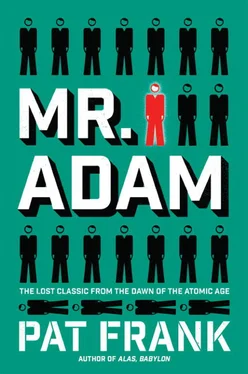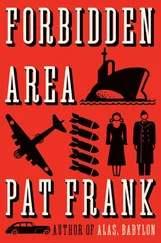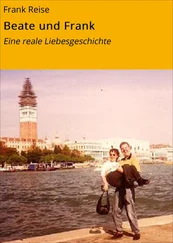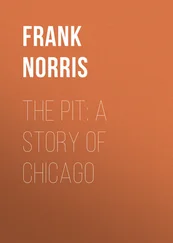“Is Homer Adam in that little box with me?” I demanded.
Klutz appeared uneasy, as if the lunch he hadn’t eaten wasn’t agreeing with him. “Oh, no,” he said, “Adam is way down here, at the bottom. You’re way up at the top.” In a little square at the end of Operations he wrote, “Adam.”
I felt a powerful urge to finish my steak, leave the check for Klutz, and catch the next train back for New York, but instead I said, “Now look, bud. The only reason I came to this goddam town was to take care of Adam. If I’m not going to take care of Adam, say so now, and I’ll be on my way. This wasn’t my idea. It came from Adam first, and then from the White House.”
When I mentioned the White House, Klutz gulped, and instantly his manner changed. “Oh, I’m sorry,” he said. “I didn’t know that.”
I recognized Klutz as one of the public servants who has no equals. He has only superiors or inferiors. Everybody is neatly tagged either above him, or below him. He keeps his nose nestled close under the coattails of those above, and his feet firmly planted on the heads of those underneath, and if he maintains this balance for thirty years he gets a pension and retires to Chevy Chase. “Well, you know it now,” I told him.
“I didn’t bring up the matter of Adam,” he explained, “because there seems to have been some confusion about him in the directives. You see, when Adam was turned over to N.R.P. the Army still managed to keep a finger in the pie. They claimed that the presidential directive merely gave N.R.P. the use of Adam, but that his security was still a matter for the Army. We reached an agreement with the Army by which a committee was set up.”
“Another committee!”
“Yes. It was set up simply to direct overall policy on Adam, personally, rather than Adam in the productive sense, and to hand down directives to the Operations Branch. I represented N.R.P. on the committee and Phelps-Smythe—”
“That bastard!” I remarked, and Klutz jumped.
“Well, he represented the Army. Phelps-Smythe and I reached an agreement that you could also sit on the committee.”
I told him what I thought of such an arrangement in a few words, all short and Elizabethan, and Klutz said he thought Pumphrey should decide, and I told him we might as well have a showdown right away.
The National Re-fertilization Project was camped in a group of buildings near the intersection of 23rd and D streets, in Northwest Washington, and it spread out into temporary structures, lately abandoned by the Navy, that occupied adajacent parkland.
Within the Administration Building there was an impressive bustle—the scuttling back and forth of girl messengers, the clatter of a typist pool, the buzz of telephones, the passionate murmurs that rose from conference rooms. Through the building there was the smell of fresh paint, and a sense of growth and change.
A new government agency on the upgrade mushrooms within the capital like a tropical plant. Its growth is exotic and surprising as an orchid, but like a fungus it is a frail plant, likely to wither swiftly and die under the cold breath of Congress or the Bureau of the Budget.
But the offices of Abel Pumphrey were cut off from the surrounding uproar by soundproof walls, and furnished in the solid good taste of one who has been firmly fastened to the public teat for years. Abel Pumphrey’s name kept appearing in the Congressional Directory long after the bureaus and agencies he headed became half-forgotten combinations of initials. He came to Washington as a liberal Republican, at the proper time switched to being a conservative Democrat, but he was born a bureaucrat. This means that he had thousands of acquaintances, no firm allegiances or convictions, no enemies, and probably no close friends with the possible exception of his wife.
He was picked as Director of N.R.P., immediately after W.S. Day, because he was considered “safe.” There wasn’t any other place to put him at the moment, and he had six children. At that time Mr. Adam had not been discovered, much less acquired by N.R.P., so the task of re-fertilization seemed more theoretical than practical. Now Pumphrey’s post had suddenly become extremely important, and of the most consuming public interest, and Pumphrey was more than somewhat worried.
Outwardly, however, he seemed calm and cheery—an apple-red and apple-round man with a Herbert Hoover collar squeezing his neck—when he greeted me. “Well, well, Steve!” he said. We had never met before. “It’s certainly fine of you to come down here and help us out. Fine! Fine! Percy here will get you all squared away. How about it, Percy?”
I didn’t give Klutz a chance to speak. I said, “I’m afraid there’s been some misunderstanding. I came here to get Adam on his feet. That’s all. Nothing else. As far as I know, that’s all the White House wants me to do.”
Every time I said White House, Klutz jumped. I decided to say it more often. “Naturally,” said Pumphrey. “I am in full accord with that. Didn’t you explain, Percy?”
“I told him about the directive,” Klutz said, “and the little committee we’d set up, and how he could sit on the committee.”
I said, “No committees. I hate committees.”
Pumphrey spread out his hands in a placating gesture. “Now Steve,” he said, “wouldn’t it be better if there was a committee, even if you did all the work and made all the actual, ah—contacts? The protection of Adam is a very delicate matter, very delicate. Very delicate, and ticklish. If anything happened, if there was, ah—any scandal, wouldn’t it be better if the War Department shared the responsibility?”
I said, “No.”
Pumphrey drooped. “I suppose ultimately,” he decided, “the responsibility is that of the President. After all, he picked you for this particular phase of our work. I’ll ask him to clarify the directive. Or maybe I’d better not. I’m not sure that it’s not clear now. Anyway, I’ll call in Phelps-Smythe, and we’ll tell him about it. Phelps-Smythe is the Army’s liaison officer over here. He’s been representing the Army on the committee, you know.”
“I know,” I said.
Phelps-Smythe hadn’t changed since Tarrytown, neither he nor his ribbons. He knew what was up, of course, and by the way he talked I could tell he had discussed it with his general and decided upon a course of action. After Pumphrey explained that the committee was ended, he said, with the formality of a diplomat delivering a démarche to a hostile state:
“The War Department strongly disapproves of relaxing security measures for the protection of Homer Adam. The War Department wishes to point out that if anything happened to Adam the future of the nation would be endangered.”
“What you mean,” I interrupted, “is that there wouldn’t be any future for the nation—or the world. Maybe that’s why the President wants me, and not you, to handle Adam.”
I shouldn’t have said it, I guess, but I couldn’t resist. Phelps-Smythe glared at me. I hoped he would have a stroke, but he didn’t. Behind his desk Pumphrey began to nibble nervously at the edge of his lips.
“The War Department,” Phelps-Smythe continued, “wishes a written release of all responsibility for the safety and protection of Adam. The War Department wishes this release immediately, because we intend to withdraw our guards and security patrols from the Shoreham at 6 o’clock this evening.”
“So that’s where you’ve got Adam caged up?” I said.
Pumphrey didn’t pay any attention. “Is the War Department going to make anything public on this?” he asked Phelps-Smythe.
“Naturally.”
“But it’s liable to start a lot of controversy.”
“That is not the fault of the War Department!”
Читать дальше












